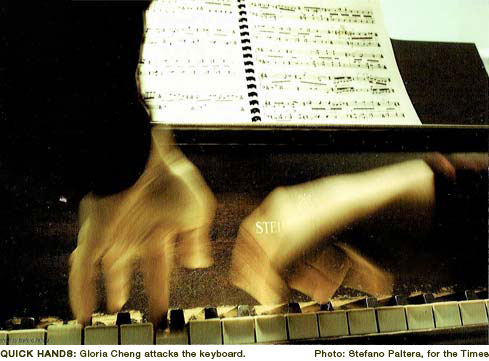 |
 |
|||||||
 |
 |
 |
 |
 |
 |
 |
||

| Back to Interviews & Essays |
EXPECT TO MAKE MISTAKES
By Chris Pasles

RISING TO THE TASK
“Every bar is some new unpredictable Mt. Everest. He likes the edge he gets by challenging the musicians.”
That’s how Los Angeles pianist Gloria Cheng summarizes playing Boulez. She is among an ensemble of nine musicians who will be performing his “Sur Incises” at Ojai (Boulez’s titles are none too easy either: This one means “On Incises,” indicating an expansion of an earlier work titled “Incises,” which means “incidental clause.”)
UNAVOIDABLE INTERPRETATION
Is there any room for the player to interpret such music? “Interpretation starts happening the minute the performer lays his or her hands on a piece,” Cheng said. “This is extremely meticulously notated, but any performer is going to bring his or her natural touch, concept of sound, physical technique and life experience to the piece.”
As for all the directions, “the specificness of the notation is what gives me something for my imagination to embrace,” the pianist said. “Otherwise I don’t know what to do with it, especially in a piece that’s abstract.”
But, she said, “it’s a grueling process. A lot of it is delayed gratification. You start on Page 1, and it doesn’t sound like much until you can actually play it, which could be months later. You’re going on faith and absorbing the language as you go. I reached the end, page 68, on my first run-through only two weeks ago. I started sometime in February.
“I always think of [learning] contemporary music as getting to know a new person. You don’t really know what you’re going to get on the first day. Some new acquaintances end up being mere acquaintances. Some you never want to see again. Some become lifelong friends.”
